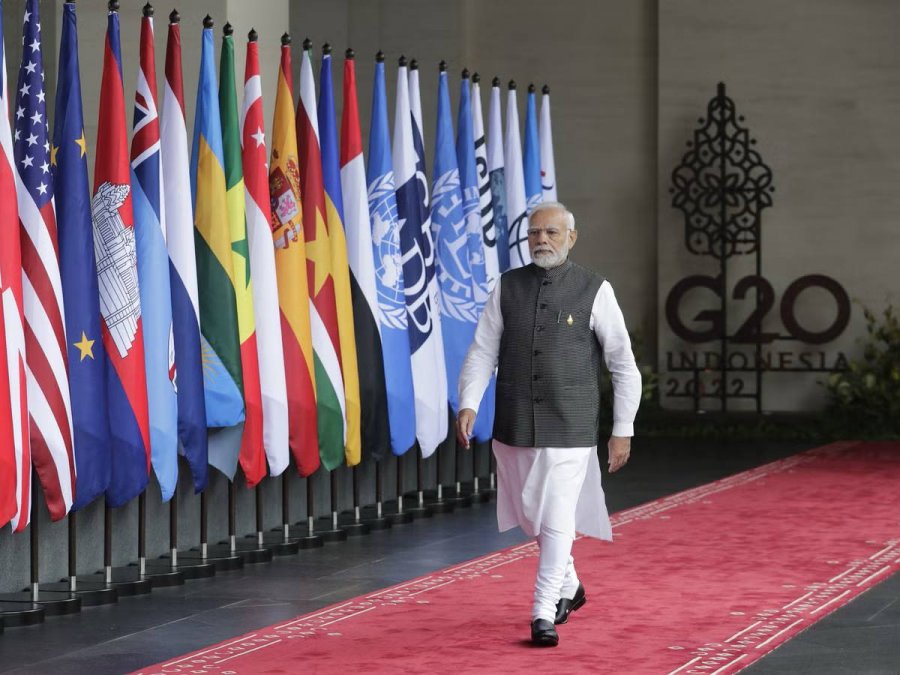G20 Summit in India focuses on development
India’s globalization and the challenge on the Silk Road
According to Iran Gate, the G20 Summit in New Delhi concluded on Monday, September 19 with a compromise statement on Ukraine. However, it was a successful opportunity for India and Modi to shine on the international stage. This Asian country and its Prime Minister can rightfully consider themselves winners of the G20 group.
The international community, which is grappling with several crises during this period, including the rifts caused by the war in Ukraine and dissatisfaction of a part of the global community towards the most advanced economies, has tested the ability of more than 300 journalists to cover high-level international political meetings and the Indian authorities, who are involved in a complex diplomatic puzzle. Nevertheless, the goal was achieved in the end, as the leaders gathered in New Delhi signed a statement allowing India to claim success.
As for Ukraine and the not-so-bold statement related to the war in that country, it can be argued that the consensus statement was flexible enough for anyone to interpret it according to their own interests. While Sergey Lavrov, the Russian Foreign Minister, considers it a success, for the French President, the statement confirms Russia’s isolation. Similarly, while some observers see it as a victory for Moscow, others view it as a significant step forward for the West.
The consensus among member countries on this statement was surprising and perplexing, according to Reuters. This is because in the weeks leading up to the summit, there were very different opinions about the war in Ukraine. Western countries were calling for criticism of Moscow due to its aggression, and Russia had declared that it would veto any resolution that did not reflect its position. However, in the end, it seems that the final statement managed to satisfy at least the majority of the group members.
Brazilian President Luiz Inacio Lula da Silva, who previously stated in an interview with an Indian online newspaper that his Russian counterpart Vladimir Putin would not be arrested if he decided to attend the G20 Summit, reiterated this statement at the end of the meeting in Delhi, addressing Putin by saying, ‘I would be honored to welcome you in Rio de Janeiro in November 2024.’
However, in the hours following, the Brazilian Prime Minister corrected his statements and stated that the decision regarding the possible arrest of Putin, for whom an international arrest warrant has been issued, is the responsibility of the judiciary in this South American country.
A necessary compromise.
In the end, a mountain gave birth to a mouse. Similarly, the final statement of the G20 group in Delhi contains cautious and general remarks about the war in Ukraine. White House National Security Advisor Jake Sullivan described the summit statement as very well-crafted because, according to him, it was designed to defend the principle that governments cannot use force to acquire territories or violate the territorial integrity or political independence of other countries.
However, Ukrainian President Zelensky, with a sharp tone indicating his disappointment and despair from the final statement, explicitly stated that there is no point in this statement that he can be proud of, to tell the truth, it seems that there was no alternative or compromise.
And in the end, Europe, the United States, and their allies agreed to refrain from condemning Moscow for the war in Ukraine, and Vladimir Putin also committed to respect the territorial integrity and sovereignty in exchange for the commitment of all signatories to the statement and to strive for a just peace.
The Financial Times wrote that the willingness of Western allies to reconcile, despite the absence of Chinese leader Xi Jinping and Moscow’s Putin at the meeting, shows how eager they were to maintain the credibility of this group, which has been under intense pressure since Russia’s attack on Ukraine over 18 months ago.
In recent months, due to the growing dissatisfaction of Moscow and Beijing with international organizations, they have found a suitable opportunity to promote a new global organized concept, which is very attractive for countries in the Global South that are often excluded from decision-making processes in major multilateral forums.
Victory for Modi
There was another reason why Washington and its allies agreed to a final compromise statement on Ukraine, putting an end to the risk of the summit ending for the first time in decades without a derogatory declaration that could have dealt a blow to India’s status as a key Western ally and Prime Minister. As a result, Western countries strongly desired to avoid it. In fact, India is considered a key ally of the West in strategies to contain Beijing, and it is no secret that Narendra Modi’s presence in the upcoming elections in the country has been planned in advance.
He wanted to turn this summit into a showcase for promoting Indian culture, his foreign policy goals, and his aspirations for leadership in so-called South-South countries. It seems that he has largely succeeded in getting closer to his goals. Analysts believe that he was able to easily secure victory in this summit without much difficulty.
Under his leadership, India has also been successful in obtaining permission to enter the African Union, committing to multilateral banking reforms, making progress in regulating digital currencies, and ultimately creating a framework for debt restructuring for poor countries. Additionally, the Prime Minister of India has demonstrated how the country can act as a bridge between the West and the East, as well as how it can fill the gaps that separate emerging economies from wealthy ones, and ultimately provide practical solutions to some global issues.
The Silk Road no longer exists.
Delhi was also the launch pad for the Global Infrastructure Investment Project (GIIP), a joint effort by the Group of Seven (G7) to finance infrastructure projects in developing countries. This ambitious project aims to connect India to the Middle East and ultimately to Europe by creating a network of ports, railways, and undersea cables, which will be implemented with the cooperation and agreement of the United States and its allies.
This corridor, which includes India, Saudi Arabia, the United Arab Emirates, Jordan, Israel, and the European Union, helps strengthen trade, secure energy resources, and improve digital connectivity. It also helps normalize relations between Israel and the Gulf countries. According to reports in the global media, this project can increase trade between India and Europe by up to 40%.
This initiative, which some in Italy call the Silk Road, is actually a balancing weight for the extensive infrastructure corridor known as the Belt and Road Initiative, which is now in its tenth year and has expanded throughout Asia, Africa, and Latin America, helping to increase Beijing’s influence over weak economies.
Despite the ambitious nature of the Memorandum of Understanding project, it only defines its objectives and does not specify its financial provisions. The signing countries will form working groups within 60 days to determine the actual timeline for project implementation. The participation in the PGAI global infrastructure and investment initiative currently includes a commitment to allocate $600 billion in resources to support low- and middle-income countries in creating sustainable infrastructure based on transparency principles.
This initiative aligns with the Global Gateway program launched by the European Commission in 2021, which aims to allocate €300 billion to finance infrastructure projects in developing countries. Modi stated today that by initiating such a significant initiative, we are actually sowing the seeds for grand dreams for future generations.
According to experts and analysts, the G20 Summit in New Delhi can be considered a victory for Indian Prime Minister Modi’s foreign policy. However, it also raises questions about China’s role. In fact, if the G20 Summit in Bali in 2022 signifies the return of Xi Jinping, the President of China, to the international stage after years of COVID, his absence in New Delhi, as well as Putin’s absence due to an international arrest warrant, has made headlines.
The absence of the Chinese leader has no specific reason, but even if it can be related to domestic issues, it is perceived as a possible disrespect to the host, indicating that the border disputes with him still continue. In addition, it currently indicates a rift among the BRICS countries, who reached an agreement a few weeks ago regarding the entry of six new members into the alliance.
Ultimately, this issue undermines the legitimacy of the G20 group as a primary forum for global issues, to the extent that the President of Brazil, who will host next year’s summit, has taken measures to ensure the presence of Putin and possibly Xi Jinping. Meanwhile, the anticipated meeting between Xi Jinping and Joe Biden will be postponed at least until the Asia-Pacific Economic Cooperation (APEC) summit, hosted by the United States from November 15 to 17.
English
View this article in English


